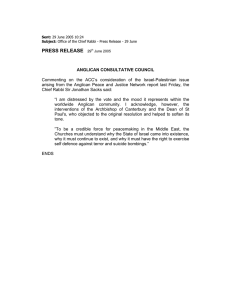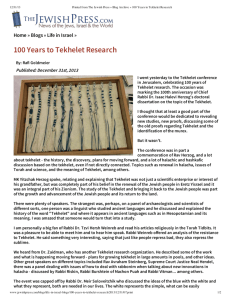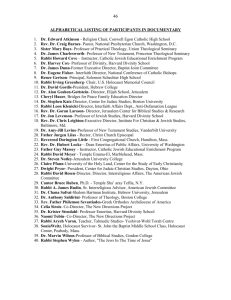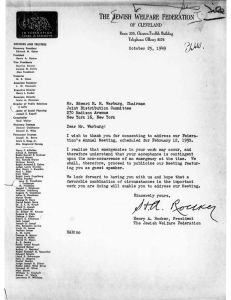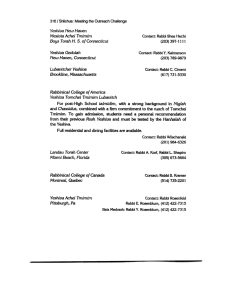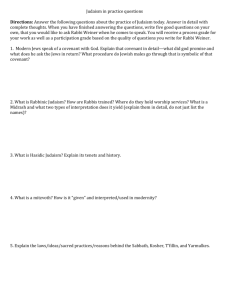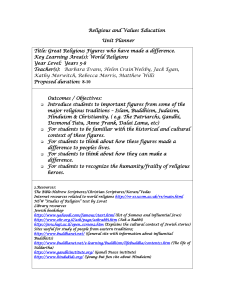12:00 Judaism Rabbi Jonathan Sacks
advertisement
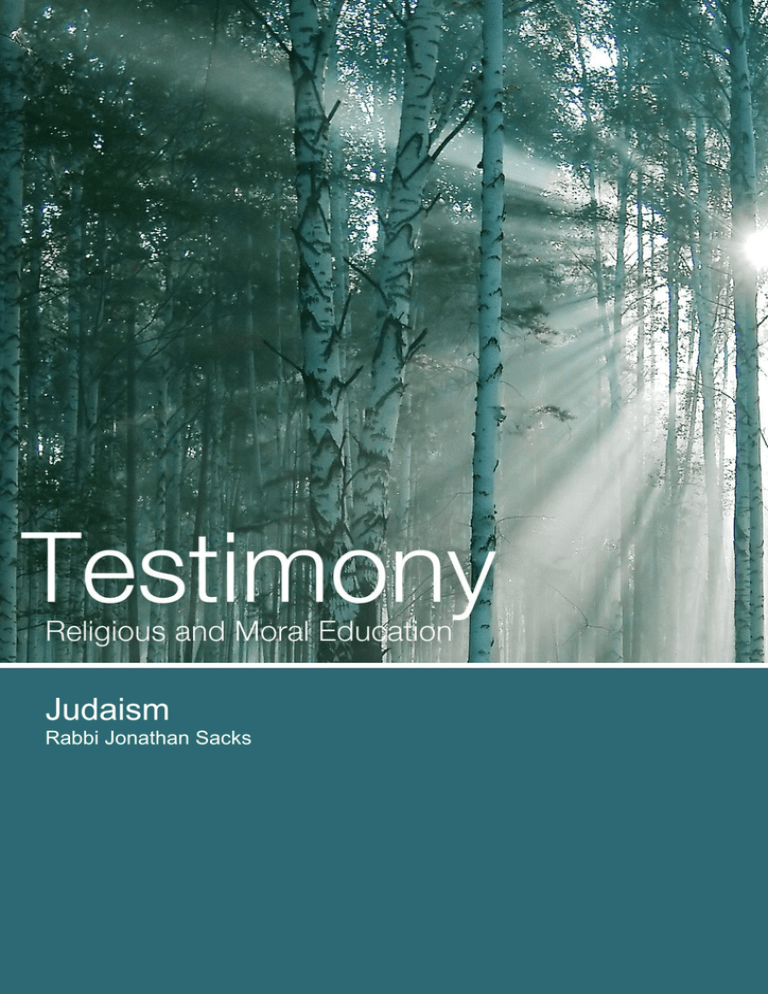
Judaism Rabbi Jonathan Sacks 12:00 Rabbi Jonathan Sacks, Chief Rabbi of the Hebrew Congregation of the Commonwealth Introduction Rabbi Sacks, or 'the Rabbi' as he will be referred to in the rest of this resource, was born in London in 1948. His Hebrew name is Yaakov Zvi. Rabbi Sacks took up the mantle of Chief Rabbi in 1991 when he was the Principal of Jew’s College and Rabbi to both Golders Green and Marble Arch Synagogues. Academic career Rabbi Sacks has had an amazing academic career. He was educated at Cambridge University where he gained a first class Honours Degree in Philosophy, then continued his studies at Oxford University as well as King’s College London, eventually achieving a Doctorate in 1981. He also studied at Jew’s College (one the oldest Rabbinical Seminaries) and Yeshiva Etz Chaim, London, after which he was ordained into the Rabbinic Tradition. The Rabbi has accumulated numerous honorary degrees including a Doctor of Divinity conferred by the Archbishop of Canterbury in commemoration of ten years as the Chief Rabbi. He has received the Jerusalem Prize 1995 for the work he has done in supporting Jewish Lifestyles in the Diaspora, the Ladislaus Laszt Ecumenical and Social Concern Award from Ben Gurion University, Israel, 2011. Baron Sacks of Aldergate The Rabbi has also been awarded a knighthood and a life peerage from the Queen. He took up his position in the House of Lords in October 2009 and sits on the cross benches as Baron Sacks of Aldergate in the City of London. His position has allowed him to talk on several public platforms including TV, radio and the national press. He frequently presents BBC Radio 4's Thought for the Day as well as a regular column in the Times Credo Column. He has also managed to arrange an annual broadcast on Rosh Hashanah on the BBC. Out of all of these achievements it is not difficult to pinpoint times when he has shown witness to the beliefs that have sustained the Jewish Faith Community for centuries. The Rabbinate of Rabbi Sacks The Decade of Renewal The Rabbi has been the Chief Rabbi of the Commonwealth for over 20 years and is now stepping down for another to be elected. When he talks about his Rabbinate, he separates it into two decades - the Decade of Renewal and the Decade of Responsibility. In his first decade the Rabbi worked towards the renewal of the Jewish Community in Britain and during this period more Jewish schools were built and attended whilst the voice of Judaism became a louder one in society in general. The Decade of Responsibility The second decade, named ‘Responsibility’, was the natural next step for the Jewish community to take. Here we see the idea of responsibility being played out within the area of the human condition as seen from Jewish eyes. In his ‘manifesto’ for the second decade the Rabbi points out that to glimpse the universe through the eyes of Judaism means searching out the goodness in each person and each situation so as to identify it, praise it and thereby strengthen it. [The Decade of Responsibility speech.] By definition this means that the Jews have a responsibility towards the world and thus it follows that the human condition carries with it a responsibility. This is something that is a constant theme of the Rabbi’s; the idea that Judaism has something to teach the whole of the world. The Rabbi uses a phrase that was at first strikingly strange. He claims in several of his books and speeches that 'Judaism is not just for the Jews'. You will find out more about this phrase later on in this resource. In the text of the launch of the second decade of his Rabbinate and his book Future Tense, the Rabbi refers to the historical significance of the smallness of the Jews. In population terms, for every Jew there are 164 Christians and 83 Muslims yet throughout history against all the odds the Jewish Faith has survived where all the great empires of Babylon, Egypt and Rome are but references in a museum. Why is this? The Rabbi says it is because Judaism is a criticism of Empires and has a concern for the whole world and not the limited boundaries of countries and is also a criticism of the rule of the powerful. In Judaism all humanity is created equally 'We are all created in the image and likeness of God, from the Greatest to the Least.' [Future Tense p77.] [Gen 1:26 Let us make man in our image, after our likeness.] The ethic of responsibility One striking difference between Judaism and Christianity that the Rabbi points out is how the description of the human condition is totally different with the traditional Christian viewpoint, namely that of the doctrine of original sin. For Christianity has always interpreted the ‘Fall of Adam’ as meaning that ALL humanity has the hardwired urge to evil actions in contravention to Gods wishes. Judaism does not have this interpretation. [Letters to the next generation, p34.] The Rabbi explains this teaching his idea of Jewish Responsibility. All humans are born with the condition of performing good or evil. It is this nature of humanity that is linked to the idea that in being made in the image and likeness of God we have the responsibility to choose that which is good over that which is evil. The story of the ‘Fall of Adam’ is a story of the consequences of the free choice that humanity possesses. (As an aside it should be noted that in Hebrew the Adam means humanity.) In an interview in the Leeds Student in 2010 the Rabbi was asked about the role of religion in developing a moral sense. His answer reaffirmed the belief in an innate something in the make up of the human person that drives them towards morality even in the basic forms of survival and cooperation. Religion is the frame work that helps humanity to practice morality. It is from this principle of being made in the image and likeness of God that is the root for what the Rabbi has called 'The Ethic of Responsibility', which is the subtitle of his book 'To Heal a Fractured World'. The Jews have a responsibility to show to the world through their living out Torah, thus living in the image of God in humanity. In his speech at the start of his second decade of his Rabbinate, the Rabbi claims that all Jews instinctively know that their lives are meant to show that man CAN make a difference. Jews are called to live their lives according to this. 'God gave us the raw materials – life, our situation in time and space as well as free will – and it’s up to us, under his tutelage, to turn them into a source of blessing. That is the challenge of Jewish Responsibility. [From the inaugural speech of the Second Decade of his Rabbinate.] Jews have a responsibility to live according to Gods laws. This has been born out time and time again if compared against Jewish history. One of the characteristics in the Jewish identity is the ability to ‘consistently [find] unpredictable ways of renewing [themselves]. In other words, the Jewish people are a people of hope.' Not victims. [Future Tense, p54.] Activities to support learning Think How much do you think that one’s up bringing influences your ideas? In a Scottish community thwarted by sectarianism how would the voice of the Rabbi help in interfaith dialogue? Reflect Research the place of prayer in everyday Jewish life. How does this influence the Jewish teaching on Social Justice? (Hint – we (humans) are all made in the image and likeness of God.) The Rabbi talks about the Jews being the only community whose Golden Age is still in the future. With regards to Isaiah 11:10-12 what do you understand by the Rabbi’s work in Inter-Faith dialogue. Talk A solo talk about Rabbi Sacks. Prepare a whole school assembly on difference and responsibility. Act Examine Lev 19:9-18 and write a modern mission statement for Jewish Social Action in the 21st century. Read Sacks J, (2009), Future Tense; a vision for Jews and Judaism in the Global Culture, Hodder & Stoughton, A Hachette UK Company. Kindle Edition. Sacks J, (2011)' Letters to the next generation 2 - Reflections on Jewish Life, Kindle Edition. Sacks J (2006) To Heal a Fractured World: The Ethics of Responsibility, Continuum International Publishing Group. Sacks J (1991) A Decade of Jewish Renewal, available from the website of the Chief Rabbi articles section. Sacks J (2001) From Renewal to Responsibility, available from the website of the Chief Rabbi articles section.
